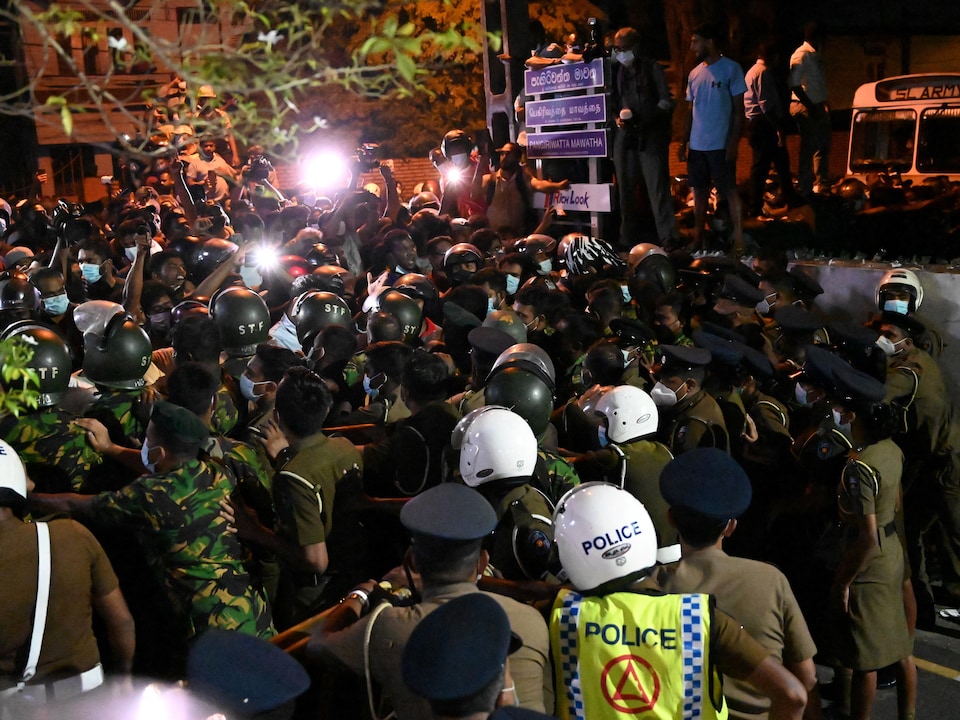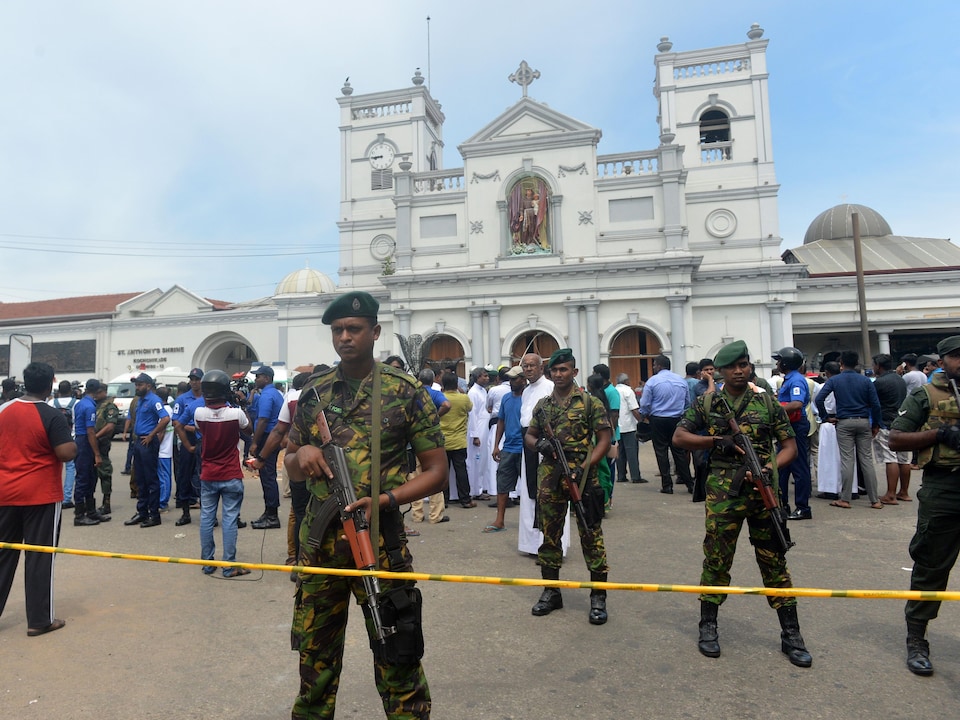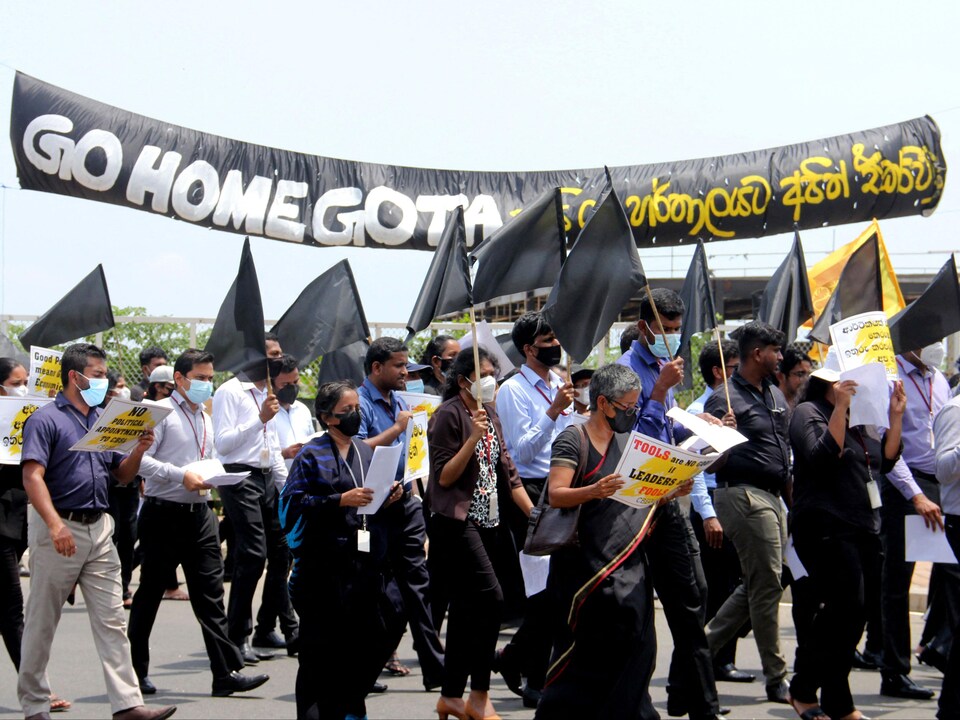Sri Lanka has been in turmoil for weeks. The population was furious and the president clung to power.
1. Why do Sri Lankans protest?
The economic situation has worsened sharply in recent months. Inflation reached 29.8% in April and the prices of some basic foods, including rice and powdered milk, rose five times. Lack of food, fuel and medicine.
Inflation eats away at people’s purchasing powersays Olivier Guillard, Asia specialist and director of information at Crisis24 (GardaWorld group). Moreover, they have no fuel to go to work and queue all day for supplies. People can’t do it anymore.
In addition, electricity is cut off for several hours every day due to lack of fuel for power stations.
Sri Lankans are demanding the resignation of the government of President Gotabaya Rajapaksa and his family clan, who they believe are responsible for this crisis.
The population is furious with its ruling class because of its incompetence, negligence and inability to find a way out of the crisis and mitigate the economic consequences.underlined Mr. Guillard, is also a researcher at the Center for Studies and Research on India, South Asia and its Diaspora at the University of Quebec at Montreal (UQAM).
The president first responded by declaring a state of emergency and deploying troops to 1eh April. Seeing that his anger had not subsided, he made changes in the government, notably dismissing two of his brothers and a nephew, who were ministers, but that was not enough to calm the streets.
After a week of clashes that left nine dead and 300 injured, the president’s brother Prime Minister Mahinda Rajapaksa, finally gave his resignation on May 9. But the president clung to power.
2. How did the country end up in this situation?
This is the result of mismanagement and a range of undesirable circumstances, Mr. Guillard observed.
Economic governance has long been weak with a series of questionable choices that have severely weakened public finances.
The Rajapaksa brothers have made huge investments in large projectsexplained Olivier Guillard. To do this, they sunk into debt in China by taking out loans in conditions above market. So, they notably built a port where they had to give to China to get the necessary funds to pay off their debt.
In addition, the Rajapaksa government decided in 2019 to reduce taxes, which resulted in huge loss of revenue for the public treasury.
A series of deadly attacks in Colombo, the country’s capital, including some against luxury hotels, in April 2019 undermined the tourism growth the country has enjoyed since the end of the civil war and that contributed greatly to the inflow of money.
Then, in March 2020, COVID-19 hit, stopping the arrival of foreign tourists in its path, in addition to meaning the return to the country of many expatriate workers, whose remittances were also used to support the economy.
Finally, in April 2021, lacking foreign currency, the government mandated that farmers should convert to organic farming and stop importing fertilizers, pesticides and herbicides.
This change, unprepared by farmers, led to a sharp decline in agricultural production, up to 40% according to experts. The shortage of fertilizers also led to a significant decline in the production of tea, coconut and rubber, export products.
Consequence: the country is facing its worst economic crisis with its foreign exchange reserves reaching a low of 2.36 billion US dollars, while it is due to pay approximately four billion dollars this year, including one billion in July.
Instead of seeking help from the International Monetary Fund (IMF) and submitting to its terms, Sri Lanka turned to India and China. But the support of its neighbors was not enough to bail the coffers and the government could not meet its $ 51 billion debt. On April 12, the country declared itself a default of payment.
3. How can he get out of here?
After his brother’s resignation, the president appointed a new prime minister, Ranil Wickremesinghe, who was tasked with forming a unity government on Thursday.
Mr. Rajapaksa also promised to reform the Constitution to strengthen Parliament.
However, according to Olivier Guillard, this will not be enough. The population is no longer capable and cannot be satisfied with scoopshe believes.
" The appointment of an individual, whoever he is, is not what the population demands. It demands a total change of regime and the departure of a family that has held the country for two decades. "
Now, enough is enough: Sri Lankans have completely lost confidenceunderlined the researcher.
Sri Lanka is currently in talks with the International Monetary Fund (IMF) for emergency economic assistance.
Source: Radio-Canada


